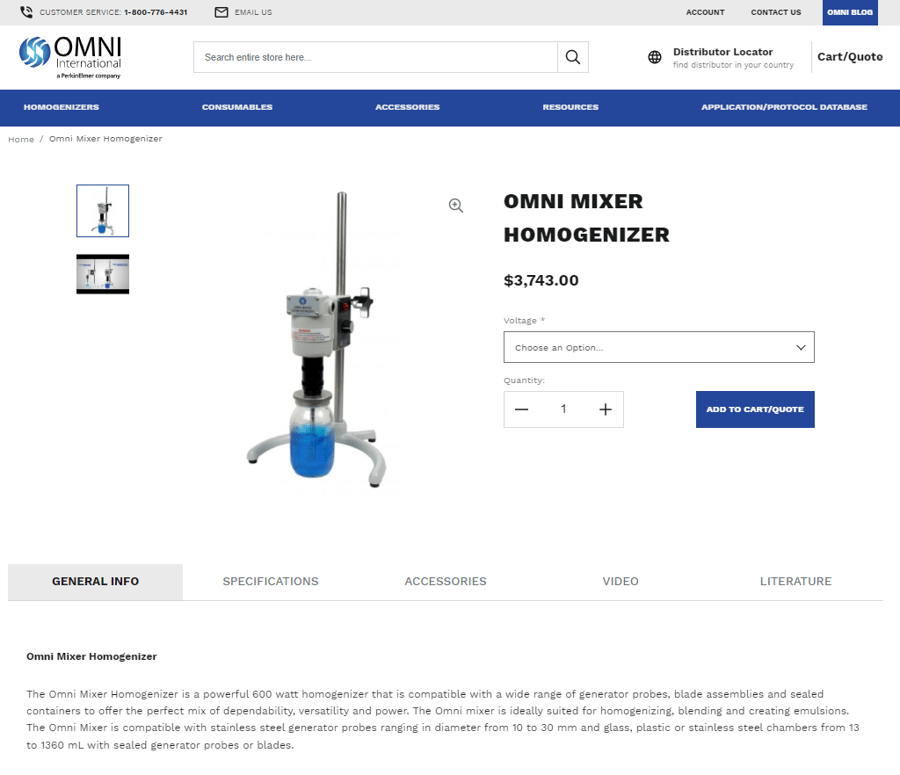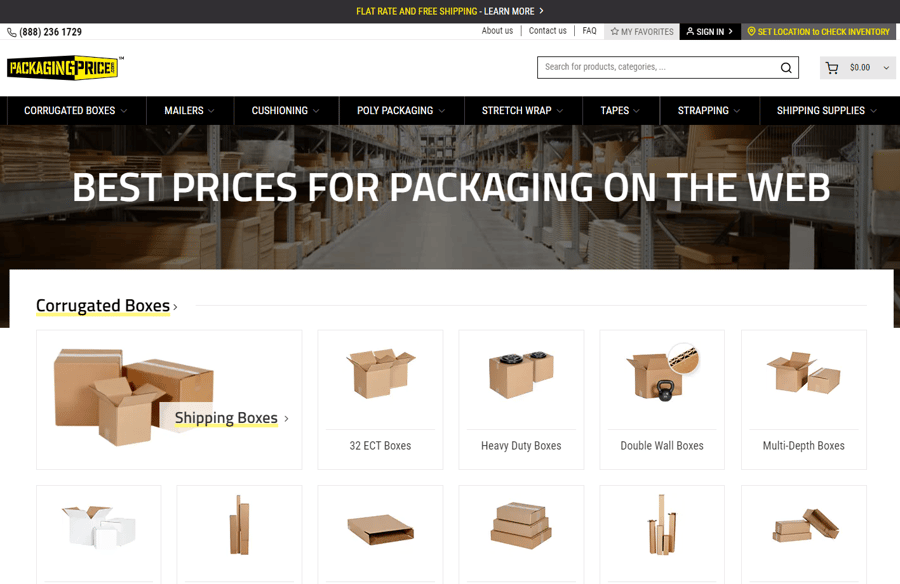Comparing the 6 Top-Rated B2B eCommerce Platforms in 2023
Our B2B eCommerce platform comparison guide reviews six of the most popular solutions and includes advice on how to research & compare your options.

With an ever-growing number of businesses opting to sell their products online, the need for a reliable and robust B2B eCommerce platform has never been greater. However, finding the right platform to use for your website can be challenging in a market with so many options — with that in mind, consider the Magento platform.
With the right development strategy, Magento has the flexibility and customization elements you need to create a user-friendly site designed specifically to suit B2B buyers’ needs. In this guide, we will explore the following concepts and answer the following questions:
Before we dive into how the Magento platform can work for your B2B business, let's quickly cover some key terminology. When we talk about Magento, we're referring to the codebase that two major platforms are built on: Magento Open Source and Adobe Commerce. Both products are owned by Adobe and use the same codebase (Magento 2), but there are some notable differences.
In simplest terms, Magento Open Source (formerly known as Magento community Edition) is the free version of the platform — it is open-source, self-hosted, and primarily supported by the community of users and developers. Adobe Commerce, on the other hand, is the paid version of the platform that has first-party support from Adobe — this platform was previously known as Magento Commerce.
For a full breakdown of the differences between these two platforms, take a look at this guide.
Magento B2B development involves customizing the Magento eCommerce platform to meet the specific needs of B2B merchants. This includes creating a custom B2B storefront, adding custom functionalities and features, and integrating the platform with B2B-specific systems such as ERPs, CRMs, and payment gateways.
Let's break down some key features of the platform. It is worth noting that to achieve B2B functionality in Magento Open Source, you will likely require the use of multiple extensions — not all the key features listed are baked into the software like they are for Adobe Commerce.
The quotes feature allows businesses to create and manage formal quotes for potential customers. This functionality streamlines the negotiation process by providing a structured way to send, revise, and finalize quotes, ensuring transparency and accuracy in B2B transactions.
The Quick Order feature simplifies the purchasing process for bulk or repeat orders. Customers can swiftly input product SKUs or IDs, specify quantities, and add items to their cart, saving time and improving efficiency in the ordering process.
With the shared catalog feature, B2B companies can create specialized product catalogs tailored to specific customer segments or groups. This capability ensures that customers only see relevant products, simplifying the purchasing experience and potentially increasing conversion rates.
The Magento platform supports flexible pricing structures, including bulk and per-unit pricing. This feature allows businesses to offer tiered pricing based on order quantity or individual unit prices, accommodating various purchasing preferences and incentivizing larger orders.
Efficient inventory management is crucial in B2B operations, and Magento provides robust tools to track and manage inventory levels. Businesses can monitor stock availability, set reorder points, and manage backorders to ensure products are always in stock when needed.
Security is a top priority in eCommerce operations, and Magento incorporates robust safety measures to protect sensitive customer data and transactions. This includes features like SSL support, secure payment gateways, and compliance with industry security standards.
For B2B businesses operating in multiple regions or with multiple brands, Magento offers multi-site support. This feature allows companies to manage multiple sites from a single admin panel, streamlining operations and enhancing consistency.
Magento integrates seamlessly with various ERP systems and other third-party applications. This integration streamlines data exchange, automates processes, and ensures that information is consistent across systems.
One of the key factors when it comes to selecting an eCommerce platform for your business is pricing — it's important to find a solution that fits both your needs and budget.
Magento Open Source, on the other hand, provides the same foundational open source eCommerce codebase without a license fee. Magento Open Source is essentially the free version of Adobe’s eCommerce offering and is more limited in its out-of-the-box functionality. Since there are no native B2B features included in the latest release of Magento Open Source, the extensions that bring these two platforms closer to feature parity will likely cost a one-time or a subscription fee on their own.
Like any other self-hosted technology platform, Magento Open Source requires you to establish the hosting environment with a third-party hosting company. Hosting environments and the associated costs can vary from $200 to $2,000 per month depending on the size of your eCommerce website, volume of visitors, transactions, and number of admin users.
Adobe Commerce is the premium version of the Magento platform, and comes with advanced features like B2B operations tools and AI-powered personalization. The more expensive cloud version of the platform adds the value of Adobe managed hosting on their cloud environment.
Companies working with Adobe Commerce, and hosting it themselves will pay a licensing fee that starts around $2,000 per month. The Adobe hosted version which is called Adobe Commerce Cloud, usually starts around $3,000 or $4,000 per month. These fees will change substantially as the usage, services, and infrastructure are scaled for larger eCommerce operations.
Magento B2B development is a complex and challenging process that requires a high level of expertise and technical skill. It involves customizing the platform to meet the unique needs of B2B merchants, which can be very different from those of B2C merchants.
B2B eCommerce involves multiple stakeholders, complex workflows, and unique business rules that must be accommodated in the eCommerce platform.
A well-designed Magento website can improve SEO in several ways:
Magento B2B development is not something that can be done by just anyone. It requires specialized skills and expertise that most merchants don't have in-house. An agency that specializes in Magento B2B development can provide the technical expertise and guidance needed to ensure a successful project.
An experienced agency will have a deep understanding of the platform, as well as the unique needs and challenges of B2B eCommerce. They will be able to guide you through the entire process, from initial planning to final implementation.
Optimizing your Magento eCommerce platform for B2B use can have numerous benefits for your business. Here are just a few of the most significant benefits:
Designing a Magento UX that is both visually appealing and easy to use is no small feat. It requires a deep understanding of your target audience and a solid understanding of the Magento platform. It also requires understanding user psychology and behavior, which can be complex.
One of the ways B2B companies are using Magento is by creating web portals that cater specifically to their B2B customers. Two of our customers are great examples.
Omni International is a leading manufacturer and distributor of laboratory homogenizers and accessories.
They were looking for a robust eCommerce platform that could accommodate their complex product catalog and B2B workflows. IronPlane worked with Omni International to create a Magento website that met their specific needs.
Omni International needed to migrate its site from Magento 1 to Magento 2, and partnered with IronPlane to improve its user interface, user experience, and shipping and bundling features, specifically for its B2B customers in the US, UK, Ireland, EU, and Canada.
With Magento, IronPlane created US, UK, Ireland, EU, Canada-specific sites, as well as a global store. On the sites, IronPlane paid careful attention to the way the site displayed related SKUs and research publications, making it easier for B2B buyers to find what they are looking for.
Because IronPlane implemented Magento's B2B Commerce edition, Omni International now offers customers add-to-cart and add-to-quote functions.

IronPlane also helped integrate the B2B site with Pardot for sales intelligence and configured a distributor locator feature for efficient checkout and back-end operations.
With these changes, Omni International has seen:
Packaging Price is a leading distributor of packaging products and equipment. Packaging Price struggled with a poorly configured Magento site, resulting in complicated B2B customer experiences and limited communication with their fulfillment partners.
After selecting IronPlane, the Packaging Price team underwent a comprehensive discovery process to understand the company's complex model and integrations.

The IronPlane team completed a code audit and worked with Packaging Price to design an efficient plan to improve the site's UI/UX, shopping cart, product discovery, email automation, and integrations. The website allows customers to select from a range of customization options, such as size, color, and material, which then dynamically updates the price of the product. This has been particularly helpful for Packaging Price's B2B customers, who often have complex and specific customization needs.
With these changes, Packaging Price realized:
The time it takes to implement a B2B Magento site can vary depending on the complexity of the project. A simple B2B Magento site can be implemented in as little as a few weeks, while a more complex project may take several months. The timeline will depend on factors such as the number of custom features required, the complexity of the product catalog, and the integration with other systems.
B2B in Magento refers to the functionality and features that allow businesses to sell products or services to other businesses. It includes features such as bulk ordering, tiered pricing, and customer-specific catalogs. B2B in Magento is designed to meet the unique needs and requirements of business-to-business transactions.
It can be, yes. Magento offers a range of B2B features that enable businesses to create a customized and streamlined experience for their wholesale customers. Magento Commerce B2B offers a range of features, including personalized catalogs, tiered pricing, custom pricing rules, and account management tools, among others.
Magento offers both free and paid versions for B2B solutions. The free version, called Magento Open Source, has basic B2B features such as custom catalogs, customer segmentation, and quote requests. For more advanced features such as bulk ordering and corporate account management, users will need to upgrade to Magento Commerce, which is a paid version.
Magento B2B pricing depends on various factors, such as the size of your business and the required features. The Magento Commerce license starts at $2,000/month, and the Magento Open Source edition is free. However, additional costs may be incurred for hosting, development, and customization services.
B2B eCommerce involves businesses buying and selling goods or services to other businesses over the internet. In this model, transactions are often conducted in large quantities and involve complex negotiations. B2B eCommerce platforms like Magento offer features specifically designed to support the needs of businesses engaged in this type of commerce.

Our B2B eCommerce platform comparison guide reviews six of the most popular solutions and includes advice on how to research & compare your options.

Learn how Magento eCommerce consultants improve your B2B or B2C user experience, increase sales, and enhance security, without disrupting your workflow.

We compare Magento, Adobe Commerce, BigCommerce, and Shopify in depth, examining how each caters to automotive eCommerce merchants.